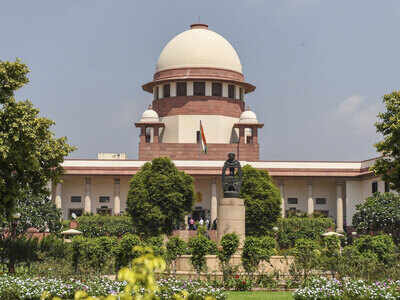Top Searches
- News
- India News
- Covid-19: High courts must not pass orders that are impossible to implement, says Supreme Court
Covid-19: High courts must not pass orders that are impossible to implement, says Supreme Court

NEW DELHI: The Supreme Court on Friday stayed Allahabad high court's order directing the Uttar Pradesh government to provide two ambulances with ICU facilities to every village in the state.
While staying the ruling, the apex court said that high courts must ponder over the practicality of their orders and not pass orders which are impossible to implement.
The observation came after the UP government told SC that the high court's order is impossible to implement in a month's time since there are as many as 97,000 villages in the state.
The top court said that high court must also refrain from dealing with issues which have trans-national ramification.
"High courts dealing with Covid management cases should refrain and restrain from dealing with issues which have trans-national and international ramifications, more so as the Supreme Court is dealing with the pan-India issues," the bench said.
A vacation bench of Justices Vineet Saran and BR Gavai said that the directions of the high court passed on May 17 shall not be treated as directives but as advice to the Uttar Pradesh government.
On May 17, the Allahabad high court while hearing a PIL over the coronavirus spread and the condition of quarantine centres in Uttar Pradesh had passed a slew of directions taking into account the death of one Santosh Kumar (64), who was admitted to an isolation ward at a Meerut hospital.
The doctors there had failed to identify him and disposed of the body as unidentified, according to a probe report.
Santosh had fainted at a hospital bathroom on April 22 and efforts were made to revive him but he died.
The hospital staff could not identify the dead and failed to locate his file. Thus, it was taken as a case of an unidentified body.
(With inputs from PTI)
While staying the ruling, the apex court said that high courts must ponder over the practicality of their orders and not pass orders which are impossible to implement.
The observation came after the UP government told SC that the high court's order is impossible to implement in a month's time since there are as many as 97,000 villages in the state.
The top court said that high court must also refrain from dealing with issues which have trans-national ramification.
"High courts dealing with Covid management cases should refrain and restrain from dealing with issues which have trans-national and international ramifications, more so as the Supreme Court is dealing with the pan-India issues," the bench said.
A vacation bench of Justices Vineet Saran and BR Gavai said that the directions of the high court passed on May 17 shall not be treated as directives but as advice to the Uttar Pradesh government.
On May 17, the Allahabad high court while hearing a PIL over the coronavirus spread and the condition of quarantine centres in Uttar Pradesh had passed a slew of directions taking into account the death of one Santosh Kumar (64), who was admitted to an isolation ward at a Meerut hospital.
The doctors there had failed to identify him and disposed of the body as unidentified, according to a probe report.
Santosh had fainted at a hospital bathroom on April 22 and efforts were made to revive him but he died.
The hospital staff could not identify the dead and failed to locate his file. Thus, it was taken as a case of an unidentified body.
(With inputs from PTI)
FacebookTwitterLinkedinEMail
Start a Conversation
end of article
Quick Links
Coronavirus in MumbaiFarm bill 2020Farmers protestCoronavirus in DelhiCoronavirus in BangaloreCoronavirus symptomsCoronavirus in IndiaWest Bengal elections 2021Coronavirus NewsSolar EclipseNPRWhat is NRCCAB BillCAB and NRCAssam election 2021Podcast newsLok SabhaTamil Nadu Election 2021CongressBJP newsKerala Elections 2021Indian ArmyISRO newsSupreme Court
